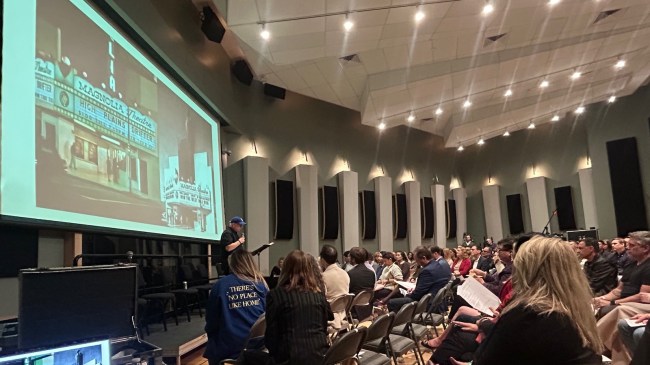
If California manages to successfully enact a law that will over twice the sum of money the state provides as tax incentives for film and television production It will greatly benefit an entertainment sector that has witnessed declines in California and Los Angeles. shedding jobs to states outside and countries abroad However, for a significant portion of the industry, particularly those in post-production roles, this might not suffice.
During a film and television sector town hall meeting held in Burbank on Monday, April 14, key figures and employees from various fields such as sound editing, music production, composition, foley artistry, visual effects, among others, came together to discuss the critical state of affairs for mid-level and entry-level professionals in Hollywood. They also addressed the steps required to bring employment opportunities back to Southern California.
The panelists at the event urged participants to contact their representatives and senators to push for the passage of the tax credit bill. Additionally, they pushed for an expanded initiative—a separate post-production incentive or a specific exemption—aimed at ensuring that productions beginning in this location would also conclude there, thereby supporting local industry growth.
“Post-production for a film might involve anywhere from several dozen to a few hundred individuals depending on the project’s scale,” explained Karen Baker Landers, an Oscar-winning sound editor and designer. “It was once common practice to do some filming outside of one’s home state or even overseas according to what the storyline demanded; however, everything would eventually return to California for editing and finishing touches. But this isn’t as true today,” she added. According to her, visual effects work, along with audio processing, video editing, and musical composition—once predominantly done in California—are now moving elsewhere due to financial benefits like tax breaks. She noted that this shift has led to significant job losses within California—not just in filmmaking but also across various sectors supporting those industries.”
Baker Landers contended that a carve-out within the present bill proposal would utilize only a negligible fraction of the total allocated tax credits since the majority of film budgets dedicate just a minor part to post-production activities. However, she emphasized that both the job creation from an economic standpoint and the personal satisfaction for individuals able to work closer to their homes instead of filming overseas would be considerable. She pointed out examples such as New York, Georgia, and Ohio, Louisiana , Australia, the UK, and Spain all include this specific exemption and are consequently more competitive because of it.
As part of his proposed budget, California Governor Gavin Newsom has recommended boosting the state’s film production tax credit allocation from $330 million to $750 million. Additionally, two new state proposals—SB 630 and AB 1138—are aimed at revamping how California awards these incentives. At a recent town hall meeting, the bill proponents, including California State Senator Ben Allen from District 24 and California State Assemblymember Rick Zbur representing District 51, addressed attendees about their respective measures.
As drafted, these proposed bills aim to boost the base tax credit from 20% to 35%, making California more appealing to film productions. They also plan to broaden the definition of qualifying productions, enabling independent films, animations, documentaries, short niche web series, among others, to be eligible for credits. Additionally, they intend to introduce new incentives specifically designed for indie projects and offer extra advantages to those filmed beyond the Thirty Mile Zone. The proposals further suggest providing greater rewards for television series that continue across multiple seasons. Lastly, they aspire to eliminate the present $100 million ceiling on project budgets for qualification purposes.
All the studios are concerned about is getting their work done; location doesn’t matter to them at all," Allen told the audience, challenging the idea that this situation benefits large corporate entities. "These companies continue to create amazing content, but now they’re simply doing so from different places. What many of our peers fail to grasp is that this issue impacts primarily those in the middle and working classes. Regardless of these changes, the studio executives will sleep soundly in Bel Air night after night.
What the bills fail to address—and which Allen and Zbur didn’t get an opportunity to comment on—is the additional exemption for post-production and music composing activities. During the discussion, one participant, casting director Jasper Randall, questioned why the state does not “remove all restrictions” and abolish the spending limit altogether like they've done in Georgia. Some filmmakers have expressed similar sentiments. criticized the bureaucratic hurdles needed to become qualified And believe that a greater reward wouldn’t be sufficient on its own. California’s Film Commissioner, Colleen Bell, and the Vice President of Integrated Communications for FilmLA, Philip Sokoloski, were also participants in the town hall meeting where they discussed several of these issues.
Introducing a post-production adjustment to the bills at this point would present significant political challenges, though it’s not unachievable since these proposals can undergo changes during the committee review phase starting next Tuesday. The governor’s budget proposal for the upcoming fiscal year, set to begin on July 1, needs approval by June 15.
The town hall meeting, held in front of a full crowd at Evergreen Studios in Burbank, coincided with the release of FilmLA’s newest report indicating that on-location filming in Greater Los Angeles dropped by 22.4% between January and March 2025 when compared to the previous year. The document also mentioned that the harm caused by the Palisades Fires had very little effect on actual shooting days.
Throughout the evening, various participants on the panel were Harvey Mason Jr., the CEO of the Recording Academy; Alex LoVerde, who heads ProdPro; as well as Pamala Buzick Kim and Noelle Stehman, leaders of the community-driven initiative Stay in LA campaign.
"It’s not an exaggeration to state that if we fail to take action, the film and television sector in California could mirror the fate of the automotive industry in Detroit," Stehman stated.




0 Comments